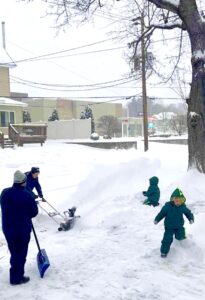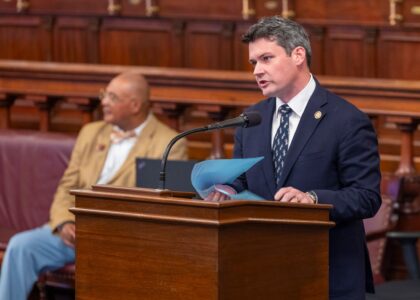Call for new strategies to support EMS efforts

Photo courtesy Commonwealth Media Services Lt. Gov. Austin Davis and Pennsylvania State Fire Commissioner Thomas Cook visit the Berkeley Hills Fire Company to tour their facility and learn about the measures they are taking to address their recruitment and retention needs, including their live-in program where participants are offered housing and training in exchange for a commitment to volunteer.
Recruitment and retention were primary challenges for Berkeley Hills Fire Company in Allegheny County. It’s one of the thousands of volunteer fire departments that make up the majority of the state’s network of first responders.
It’s not an easy job, and finding those with the time, flexibility, and interest to do it has become increasingly difficult. Some say it’s a shift in values, while others point to the financial strain and life stressors faced by men and women in the potential recruitment pool.
The company’s website advertises professional training and certification, gear and uniforms to fight fires, scholarships to learn more about fighting fires, health and wellness perks to keep recruits fit for fighting fires, life insurance and discounts on property tax, and even modest stipends. The company’s live-in program offers extensive training and experience in exchange for 40-hours of shifts per week. That is to say, volunteering is a full-time job.
The live-in program was developed after the department mounted a delayed response to a local fire that they deemed unacceptable.
“We had to take corrective action to make sure that we were providing the best service possible,” said Fire Chief Dillon Coleman.
The program has grown from three bunk beds in a converted office to eight private bedrooms and three bathrooms with eight residents and a waiting list. They say the shift has improved response times and benefited the company immeasurably. Now, their struggle has less to do with personnel and more to do with finances.
The plight of these departments is one the Shapiro administration has been eager to draw attention to and support for, especially in the wake of an arson attack at the Governor’s Residence that was successfully handled by a mix of paid and volunteer firefighters from the Harrisburg area.
The state has also seen increasingly common wildfires in the vast wooded areas for which it was named. Crews are currently containing two wildfires in Michaux State Forest and earlier in the week saw a fire in the Jim Thorpe area of Carbon County.
Shapiro’s newest budget proposal includes a new $30 million allocation of state money for competitive grants for fire companies, which struggle to make ends meet with a combination of funds raised by their volunteers and contributions from local municipalities. On average, they each receive about $15,000 from an annual grant provided by the state.
Rigs and equipment, on the other hand, can cost millions and are expensive to maintain. Meanwhile, fire chiefs have sounded the alarm on the narrowing field of suppliers who have started to monopolize the market, raising prices and wait times for essential parts and products.
Lt. Gov. Austin Davis and other state officials joined firefighters at Berkeley Hills to promote the proposed grant program.
“Changing times demand new strategies,” said Davis. “Nearly every fire company is facing issues with recruiting new members and purchasing new equipment.”
One of those new strategies is incentivizing collaboration between regional departments. It can be a tough pill for many volunteers, who take great pride in their companies, to swallow. Nevertheless, many, including state Fire Commissioner Thomas Cook, say it’s a necessity for departments’ survival moving forward, and department survival ensures civilian survival.
“Pennsylvania currently leads the United States in civilian fire deaths,” said Cook. “We need to start taking steps to reverse that trend, and one of the ways to do that is to provide funding to our volunteer service that allows more programs like we have here at Berkeley Hills that put staffing on fire trucks because the rapid response saves lives.”
Rep. Emily Kinkead, D-Pittsburgh, who represents Ross Township where Berkeley Hills is located, spoke about the issue. “When we are looking at fire engines that are ordered and aren’t seen until three, four, five years later, we have to come up with new ways to be able to support our volunteer firefighters to make sure that they are able to do what they need to do and also keep themselves safe. I think that a lot of our community members don’t really understand what our volunteer firefighters are doing for free,” said Kinkead.






